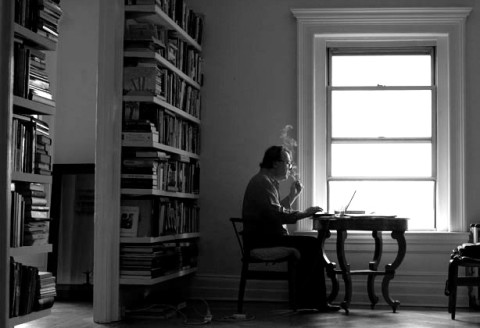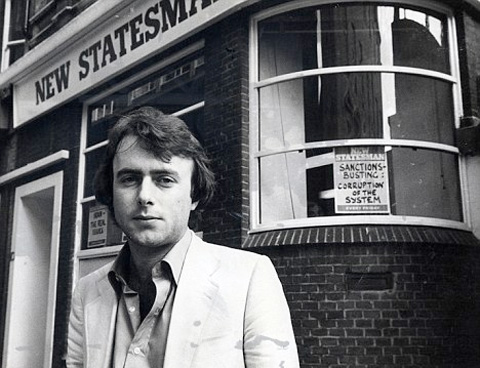The first time I read an essay by Christopher Hitchens it triggered in me an almost magnetic alignment. It is what influence feels like, palpably. Your notions, deductions, biases, obsessions, interests, and proclivities drift, loosely organized in patchwork clumps, downstream. They bump up, shift, and self organize, when suddenly a forceful current snaps them into order. Everything just locks into place.
I wish I could remember what it was about, my first draught of this amazing, lusty, brilliant mind. Maybe it was about the culture of snitching in East Berlin, or the necessary example of Thomas Paine. A full throated and eloquently argued brief against the very notion of the divine. The disgrace of Clinton. The grace of the Kurds. The hangover scene in Lucky Jim. Orwell with a side of Orwell in an Orwell sauce. Later it may have been on poetry, the lovely considerations of Czes?aw Mi?osz, or Fenton, Seidel, and Larkin. Reading Lolita as a father. The rallying, with righteous and sometimes nearly blind fervor, to the fight against Islamofacism. Amidst the pamphleteering, a steady stream of passionate criticism, elegant and lingering appreciations of Wodehouse, Wolf Hall, and, most delightfully, that libidinous rogue, Sir Harry Flashman.
In a way, though, it hardly matters. It wasn’t really about concurring with his arguments; it was following the manner of his thought, tracing its grain. Wanting to think like that, argue like that. In conversation or argument insisting on the significance of the melodramatic flourish, a theatrical toss off… the gregariousness, the bonhomie, the relish…. the decency of it all.
# # #
People disproportionally focus on the atheism, lately. I get it, as it really was the topic that propelled him, like Richard Dawkins, to general fame. It’s a shame, though, because it misses the larger point of it all. It was religion’s ongoing project to extinguish the nourishing legacy of the Enlightenment that fueled his fury. Broadly speaking, Hitch advocated for the credit due to a species that could put aside its animal nature and build and nurture this miraculous idea of civilization. To suppress, punish, or deny humanity this achievement and its benefits was an act of the basest evil – a denial of humanity itself. The stupid, pointless loss, the vandalism – the human cost of all of this idiocy – is what called him to the thick of it. It was a front he never tired of patrolling and a battle he never failed to enjoin.
Hitch’s ultimate argument, then, was to not to advocate against religion but for literature. He resolutely maintained that it was in our poems, our books and our paintings that we really grapple the most honestly, the most subtly, and the most fully with the fundamental questions and dilemmas of our existence.
Oh, and yes, there’s the drinking. And yes, it was herculean. But looking at it through the framing conceit of mere drinking, whether to condemn or to celebrate, is shortsighted and, I think, a little vulgar. Again, we’re missing the essential point of it all. As he put it:
I always knew there was a risk in the bohemian lifestyle… I decided to take it because it helped my concentration, it stopped me being bored — it stopped other people being boring. It would make me want to prolong the conversation and enhance the moment. If you ask: would I do it again? I would probably say yes. But I would have quit earlier hoping to get away with the whole thing. I decided all of life is a wager and I’m going to wager on this bit… In a strange way I don’t regret it. It’s just impossible for me to picture life without wine, and other things, fueling the company, keeping me reading, energizing me. It worked for me. It really did.
Exactly. No, seriously – exactly. This is the wager we enthusiasts make – appetite and curiosity always pushing, unbalancing our keel, lurching into the waves to feel the contour of experience…. Hitch nailed it here. He’s written reams of defiant endorsements of bohemian life before, squarely standing his ground against pious pick-nose hall monitors, amidst a swirl of smoke, clinking glass in hand. This time buy vicodin chicago it’s tempered. Caution enters the frame. The bet has been called. He wagered too much. He didn’t get away with the whole thing. With this last dash of restraint, the recipe is complete. Mix well and enjoy.
# # #
Appreciations of Hitch are always anchored by anecdotes. It seems his essence was in person, when all these aspects were gathered up in the full force of his personality. Like many of this readers, I’m sure, I’d daydream now and then of what it would be like to find myself in his company. Absurdly enough, chance and accident tumbled in my favor one evening in Los Angeles, in the late 90’s.
Hitch was touring his new broadside, No One Left to Lie To-The Triangulations of William Jefferson Clinton and I went to go see him read. The reading was raucous, funny, and bracing. Afterwords (after the cops led out the LaRouche plant) he held a signing, and when my turn arrived I basically thanked him for the company of his bullshit detector, and, if I remember right, mentioned the Chicago journal The Baffler, with which I was really besotted at the time.. After some appreciative nods Hitch thanked me, and as I walked away, a young Anglo-Indian named Palash Davé, who was filming the reading, asked me if he could interview me for a documentary about the book tour. Sure, I said, and asked him to join me for a smoke outside. After a bit of a filmed banter between me and a young black labor organizer we just started grousing as the crowd dispersed.
I asked him if there was a way I could keep in touch with him to keep track of the project. He said yes, then asked if I would like to have a drink with him and Hitchens that night. Cue all sputtering cliches…
So I end up going back to his hotel room… Hitch greeted us at the door and wolfishly explained that it was the same suite where Clinton stays when he’s in Los Angeles (he couldn’t wait to mark the room with smoke and whiskey). Along with Hitchens and Palash were his wife Carol Blue, Steve Wasserman- the editor at the time of the LA Times book review, and old leftie whose name I can’t recall, and the guy who shot Saturday Night Fever.
Hitchens was an effusive and diligent host. Asked me what I wanted to drink, and then led me out to the balcony, where he and I talked for about an hour, drinking Jack Daniels and smoking his Rothmans’s… Folk began to leave and the night eventually boiled down to me, Hitchens and Palash, drinking and talking until we cleaned out the mini-bar.
What a chat – From Clinton, of course, to the fate of the Left, our generation, Dylan, more on the Baffler and the art/music/politics mafia of Chicago, a long boozy dissertation on the film “Glory,” books and more books, authors (Murry Kempton & John Dos Passos, mostly) and the private tax revolt of home packed cigarettes.
The drink and tobacco exhausted, he offered a round of coffee and room service. I declined, feeling the onset of the mental fog I could no longer hold back. The bill had come due. Home, then.
# # #
There’s a reason we’re anxious about influence. To be shaped by external forces means, as individuals, that we need to yield, to go just a little slack, so our posture shifts, changes, molds. We surrender. We risk being supple for the promise of being shaped. You strike a balance between being propelled and being subsumed.
The exhilaration, though! – when you encounter, and engage such a force, and, under your shaky grip, you let it sweep you away…. His moral clarity, his insistence on literature, and art, really, as the soul of humanity, and the lusty brio with which he lived have profoundly formed and informed me. If all the world’s a stage, he was a character for the ages. We are vastly poorer for his absence. Civilization has lost one of it’s great knights and I have lost one of my brightest guiding stars. Farewell Hitch. That was a damn good show.

